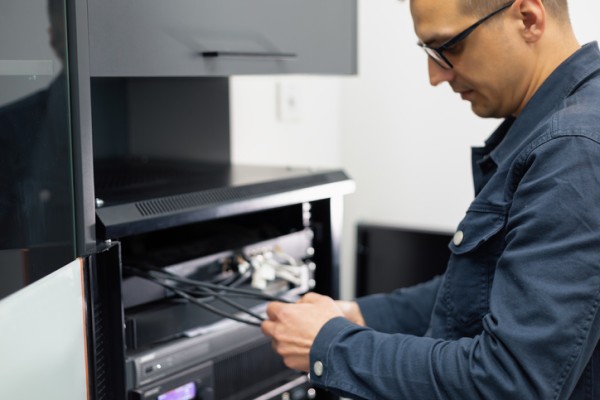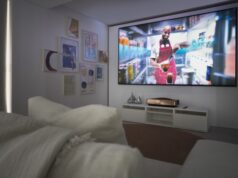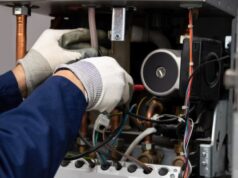
Streaming sticks and smart TVs might dominate today’s living rooms, but a home theatre PC (HTPC) still offers serious advantages. Whether you’re a movie buff, a gamer or someone who wants full control over their entertainment setup, a dedicated HTPC can be the most flexible and powerful option—especially in a purpose-built home theatre.
Here’s what you need to know about building or integrating a modern HTPC into your home.
What is a home theatre PC?
A home theatre PC is a computer specifically set up to play and manage media content—like movies, TV shows, music, streaming services and even games—on your main screen or projector.
Unlike a smart TV or media streamer, a HTPC gives you:
- Full control over software and updates
- Better hardware performance for playback and gaming
- Massive storage for offline libraries
- Support for high-end audio and video formats
- Access to PC-based apps and games
Modern HTPCs can be built into compact, quiet cases that blend into your entertainment unit, or rack-mounted into an AV cabinet for a more professional setup.
Why use a HTPC today?
With so many options like Apple TV, Chromecast and smart TVs, why bother with a HTPC?
Because no other device gives you the same customisation, power and versatility.
- Want to run your entire Plex server and stream 4K Blu-ray rips? No problem.
- Need to mix Netflix, Steam games, music apps and local files in one place? Easy.
- Prefer full keyboard/mouse control and multi-tasking? Done.
A HTPC isn’t for everyone, but for tech-savvy renovators or builders creating a high-performance home theatre, it offers unmatched flexibility.
Key hardware for a modern HTPC
When building or buying a HTPC in 2025, here’s what to look for:
Processor (CPU):
An Intel Core i5 or AMD Ryzen 5 is more than enough for 4K video playback and general use. For gaming or heavy multi-tasking, bump up to a Core i7 or Ryzen 7.
Graphics card (GPU):
For video playback, integrated graphics are often sufficient. If you want gaming performance or hardware decoding for advanced formats like AV1 or Dolby Vision, invest in a current-gen GPU (e.g. NVIDIA RTX 4000 series).
Memory (RAM):
8GB is fine for media use. Go with 16GB or more if you plan to game or run multiple apps simultaneously.
Storage:
- Use a fast SSD (500GB or more) for the operating system and apps.
- Add a large-capacity HDD (2TB–10TB) for storing your media library.
Cooling:
A HTPC should be quiet. Use low-noise fans, passive cooling or liquid cooling if it’s part of a high-performance build.
Case and form factor:
Look for compact mini-ITX cases or horizontal HTPC cases that match your AV gear. Ensure good airflow.
Remote control:
Pair your HTPC with a wireless keyboard with a trackpad, or a dedicated media remote with IR or Bluetooth support.
Operating system and software
Windows 11 is the most common OS for HTPCs, thanks to broad app support. However, some users prefer Linux-based options like Kodi-based LibreELEC for simplicity and speed.
Essential apps include:
- Plex or Jellyfin: Media servers for organising and streaming your collection
- VLC or MPV: Open-source players for every file type
- Steam or Xbox App: For gaming on the big screen
- Spotify, YouTube, Netflix, Disney+, HBO Max, Stan, Amazon Prime: All accessible via browser or apps
- Kodi: A popular all-in-one home theatre interface for local libraries
Audio and video integration
Modern HTPCs can output high-resolution video and uncompressed surround sound via HDMI 2.1. To take full advantage of this, make sure your HTPC connects to:
- A 4K HDR-capable TV or projector
- A receiver or soundbar that supports Dolby Atmos or DTS:X
- High-quality speakers placed for immersive sound
Using a HTPC also allows for more flexible integration of subtitles, audio tracks and calibration tools for picture and sound—ideal for a custom-built space with proper lighting and acoustic treatment.
Networking and control
A HTPC needs fast, stable internet. Use Ethernet over Wi-Fi wherever possible to ensure seamless 4K streaming and large file transfers. Integrate your HTPC into a broader home automation system for voice control, smart lighting and more.
Final thoughts
A home theatre PC is still a powerful option in today’s streaming-dominated world—especially for those who want total control over their media, from local collections to advanced gaming setups.
If you’re planning a new build or renovating a media room, consider including:
- An AV rack with ventilation
- Ethernet points behind the screen or projector
- Soundproofed walls and ceiling
- Tiered seating and blackout curtains
With the right planning, a HTPC can be the heart of an incredible home cinema experience.





